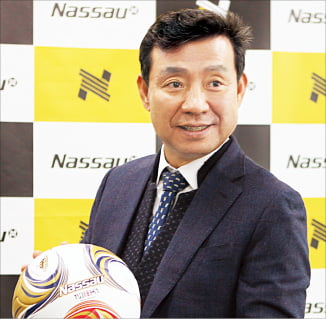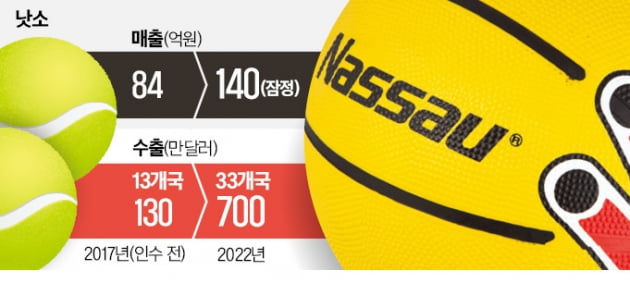NEWS
| Title | A Homegrown Brand’s Comeback: Have You Heard of Nassau? |
| Content |
January 9, 2023 | Reporter: Choi Hyung-chang, Hankyung
The Korean sports brand Nassau has made a comeback. While global sports giants like Nike and Adidas dominate the market, Nassau, once struggling with persistent losses, has returned to profitability thanks to the World Cup football fever and a growing boom in tennis. Founded in 1971, Nassau is a domestic brand?despite its name having led some to mistakenly believe it was Japanese. The company initially grew by manufacturing sports equipment such as footballs and tennis balls. However, as international brands entered the Korean market, Nassau’s position began to diminish. The company changed hands several times before Ju Eun Hyung, who currently serves as CEO, acquired it in 2018. In an interview at Nassau’s headquarters in Goyang, Gyeonggi Province on the 9th, Ju reflected, “I didn’t know it would be this difficult when I took over the company,” adding, “After taking office, I focused on stabilizing our factory in Indonesia, and now we are beginning to see the results.” Ju, who previously worked at a major corporate economic research institute and later ran a memorial park business, said he decided to acquire Nassau immediately after hearing it was on the verge of liquidation?without even conducting due diligence. “It was heartbreaking that a brand with such high name recognition was collapsing simply due to a lack of funds,” he said. “Also, after visiting places like Africa and Southeast Asia during missionary work, I saw how much children loved receiving footballs. I acquired Nassau with the determination to bring dreams and hope to children in underprivileged countries.”
After taking over the company, he realized the situation was worse than expected. Nassau’s Indonesian subsidiary, which operated its main production facility, had essentially been abandoned, with the salaries of 300 local employees unpaid for four months. Ju explained, “I tracked down someone who had been regarded as the most competent among those who had worked at the factory. It took four visits to bring him back,” adding emotionally, “Through that, we were able to achieve both workforce restructuring and productivity improvement.” Nassau’s domestic distribution network had also largely collapsed. “It was a pre-modern system,” Ju said. “They used to assign regional distributors who would pass products down to retailers or wholesalers. But the online marketplace had already become mainstream by the 1990s. Their marketing strategy was far too outdated.” Nassau, once a small powerhouse brand exporting to 56 countries, saw its presence shrink to just 13 nations before Ju's acquisition. Since then, the company has gradually restored its overseas markets and last year exported $7 million worth of goods to 33 countries. Combined with the Indonesian subsidiary, Nassau recorded approximately 14 billion KRW (around $11 million) in revenue for 2022?marking the first consolidated operating profit since the acquisition. “Our exports grew 280% year-on-year,” Ju noted. “Orders are more than double our actual sales, but we’ve had to turn some down because our production capacity can’t keep up.”
Those who assume Nassau’s technology lags behind global brands are mistaken. “With nearly 50 years of experience making footballs, we have accumulated a wealth of know-how at our research center,” Ju said. “As a result, we developed the world’s first four-panel football design.” Most footballs are made from 32 stitched panels?12 pentagons and 20 hexagons. In contrast, Nassau’s “Tuji” (Fighting Spirit) model is composed of just four panels, reducing air resistance and allowing even amateur players to perform powerful, knuckleball-style shots. The recent rise in tennis popularity has also boosted the company, with tennis-related sales quadrupling year-over-year. Despite its challenges, Nassau has remained committed to aiding underdeveloped nations. For the 2020 Tokyo Olympics, the company provided uniforms, apparel, and sports equipment to the South Sudanese Olympic delegation, and its support continues to this day. Ju emphasized, “Whether the company is in the red or black, I believe such efforts must continue?that’s my philosophy.” He added, “South Sudan is the only country in the world where civil war is still ongoing. What’s more tragic is that children are being exploited in the conflict.” Ju explained, “When you offer footballs to children who are holding guns without knowing why, they come out willingly. That’s what inspired me to start sending footballs to South Sudan.” Looking ahead, Ju revealed plans to diversify Nassau’s business. “We’re collaborating with Kakao to create sports products featuring popular characters,” he said. “We’re expanding into areas such as sports airdomes, apparel, and even investing in the development of robotic golf caddies.” He concluded, “My dream is to establish a globally recognized company that operates like a true enterprise and proudly spreads Korean sports and cultural content around the world.” |


